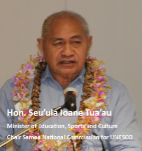On 11 and 12 January 2022, the online Asia-Pacific Regional Consultation was held under the
chairmanship of the Ministry of Education, Culture, Research and Technology of Indonesia and with
the Ministry for Cultural Development of the Cook Islands as Rapporteur, in the run up to the
UNESCO World Conference on Cultural Policies and Sustainable Development – Mondiacult 2022 ,
with a view to shaping a new global agenda for cultural policies.
Ministers and senior officials of 32 countries, as well as more than 20 leading Intergovernmental
organizations and NGOs from the region met online over two days and shared key trends, issues and
priority areas of policy engagement for culture, such as digitalization of resources, protection and
promotion of natural and cultural heritage, both tangible and intangible, legal framework to protect
cultural properties and cultural rights and strengthening of data and statistics.
“As we entered the last Decade of Action for the United Nations Sustainable Development Goals,
UNESCO is engaging its Member States and the international community to embark on a renewed
reflection on cultural policies to tackle global challenges such as inequalities, conflicts, technological
revolution or climate change”, says Mr. Ernesto Ottone R., Assistant Director-General for Culture of
UNESCO.
The Asia-Pacific Regional Consultation was the second of five regional consultations planned between
December 2021 and February 2022 in preparation of UNESCO – Mondiacult 2022. Indonesia was
leading the Consultation for the region – one of the widest and most diverse one of the World.
Of the first Member States to take the floor, Samoa was represented at the online meeting by the
Minister of Education, Sport and Culture, Honorable Seu’ula Ioane Tua’au. The Minister noted that
”Samoa’s commitment to safeguarding our Heritage, Cultural Industries and Culture through
Education is grounded on our beliefs, customs and systems of who we are as people. Our cultural
heritage (measina), customs (Fa’a-Samoa) and culture (aganuu) is highly valued and regarded as
tools of knowledge that has been translated into the development of our Cultural Policies”. In his
statement Honorable Seu’ula Ioane Tua’au highlighted the work carried out in partnership with
UNESCO, and guided by the Samoa National Culture Framework (2018-2028) and its Culture Policies
– Heritage Policy, Culture Industry Policy & Culture in Education. The Minister’s intervention also
included suggestions on future critical areas of engagement with particular emphasis on safeguarding
Living Heritage and Traditional Knowledge.
Please address all
correspondence to the Chief
Executive Officer – Ministry of
Education, Sports & Culture
GOVERNMENT OF SĀMOA
MINISTRY OF EDUCATION, SPORTS & CULTURE
Identifying the renewed role of Culture in Sustainable Development
Over the past decades, the global landscape and the cultural sector have profoundly evolved. Newly
emerged fault lines as well as global challenges have pushed countries to adapt their public policies to
better fulfill their role in protecting and promoting global public goods, including culture.
Meanwhile, the COVID‐19 pandemic has starkly exposed the shared vulnerability of countries in
facing emergency situations while ensuring social and economic sustainability. In this context, the
widespread disruption faced by the culture and creative sectors calls for more robust cultural policies.
Whilst the health crisis has starkly highlighted the role of culture and the arts for the resilience of
people and communities, it has also brought to light the sector's key contribution to enhance the
sustainability of local and national economies.
Among other priority areas, many countries of the region particularly highlighted the necessity to
adapt the cultural sector to the digital transformation. Issues pertaining to intellectual property rights
and copyright were mentioned as areas of focus in the context of increased distribution and
consumption of online cultural contents. The wealth of traditional knowledge and skills in the region
was presented as a source for developing more sustainable and resilient communities, notably through
the safeguarding and promotion of indigenous knowledge to fight against climate change and in
support of food security. The engagement and the increased mobilization of youth is an encouraging
opportunity that is visible in the Asia-Pacific Region. Support for the youth through arts and cultural
education are central to cultural policies. Cultural tourism, covering all dimensions of culture – from
built heritage to living heritage – was also mentioned by many countries as a lever of sustainable
economies and inclusion of women and the youth. Finally, the rise of cultural routes was highlighted
as an indication for a strong trend towards cultural diplomacy across the region.
Echoing this renewed policy attention, UNESCO – Mondiacult 2022 will be convened by the
UNESCO Director‐General and hosted by the Government of Mexico from 28 to 30 September 2022.
Forty years after the first Mondiacult World Conference on Cultural Policies held in Mexico City
(Mexico) in 1982, and 24 years after the UNESCO World Conference on Cultural Policies for
Development held in Stockholm (Sweden) in 1998, the World Conference will provide a new
momentum for the global policy dialogue on culture for sustainable development.

